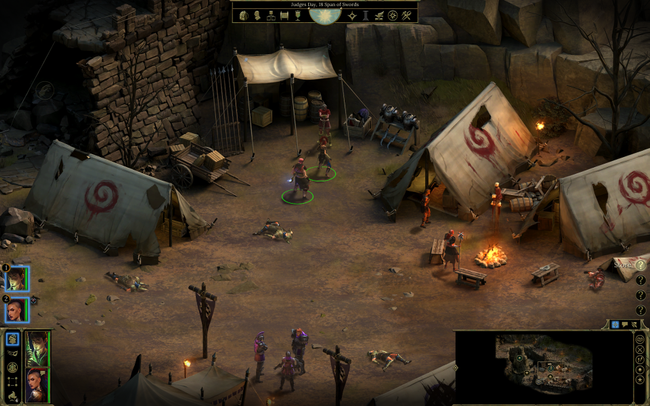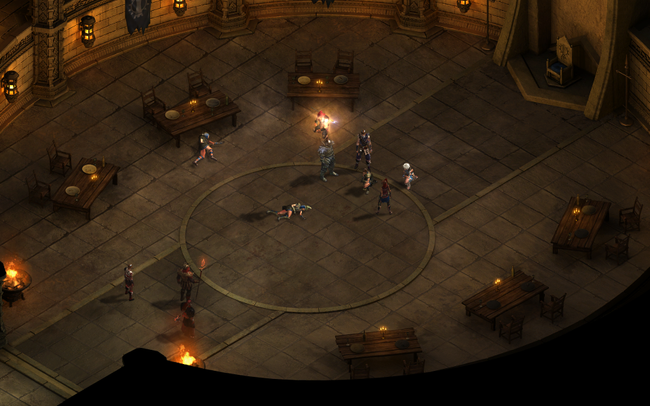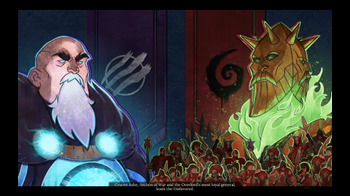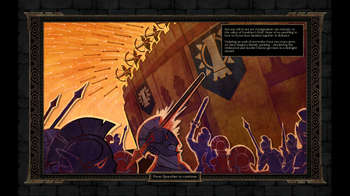Tyranny Review
Obsidian Entertainment has been something of an RPG cult darling for over a decade, dating back to Knights of the Old Republic 2 in 2003 and maintaining a loyal fanbase ever since. Garnering a deserved reputation for clever writing and unparalleled world-building, do the developers measure up to the same expectations with their newest title?
In their second game partnership with publisher Paradox Interactive following 2015’s Pillars of Eternity, Obsidian changes its focus with Tyranny, a somewhat experimental title that builds on the foundation set by Pillars but with a much narrower and unique spin on the traditional cRPG. Where Pillars had a much more orthodox set of western high fantasy themes and motifs, Tyranny turns some of these expectations on their side by placing the player in a position of power at the outset of the game: a position on the side of evil.

In Tyranny, you take the role of a Fatebinder, a high ranking role underneath the evil Overload Kyros who seeks to conquer the countries of The Tiers to expand her own empire. As Fatebinder, it is your role to adjudicate the armies of Kyros as they campaign across the Tiers, seeking to conquer the various factions and cites of the region.
Kyros has enlisted the aid of several Archons - effectively generals of various abilities and motivations. It is up to the Fatebinders to arbitrate the various conflicts between these factions as you seek out this overarching goal.
In this way, Tyranny is not a game about unveiling a larger narrative exposition, or revealing long held secrets of an unfamiliar nation. The overarching motivation at the start of the game holds throughout the title and this focus does not really shift. Instead, it is the smaller and more personal interactions between those affected by the conflict where the player will find themselves weighing out notions of loyalty, respect, fear, and wrath as they seek to use whatever means necessary to carry out Kyros’ will.
Interestingly enough, the conflicts the player finds themselves in the middle of is not limited to only the Overlord’s forces against those of the Tiers, but between the Archons themselves.
The two largest factions of the game are both armies of the Overlord: the loose collection of gangs known as the Scarlet Chorus, and the disciplined rank-and-file military faction of the Disfavored. While both groups work under the same leadership, their difference in motivations and methods continuously put the groups at odds. The player will naturally find themselves allied with one over the other.
It is not really possible to make friends with everyone. Complicate this with the player’s changing reputation with the countries of the tiers, the Fatebinder’s allied companions, and the Archons themselves, and decisions made in Tyranny will naturally form allies and enemies in a process that feels organic and not-at-all game-y: a commendment to Obsidian’s trademark quality writing and characterization.
Fans and players of Pillars of Eternity will find themselves comfortably familiar with Tyranny from the moment they boot up the game. Character creation and general gameplay largely rhymes with the systems found in Pillars and other Obsidian titles. The one important change in Tyranny that players new and old will encounter right away is the “Conquest” phase of character creation.
After deciding your characters stats, role, initial spells, etc., the player will have to make key decisions of Kyros’ initial invasion that will determine your starting reputations with many of the factions of the game. It will even give you certain abilities or skills depending on your choices, such as deciding which cities to focus the invasion on, or how you decide to negotiate surrender for any given location.
The neat part about this process is the decisions made in Conquest will have effects during the course of the game are largely very difficult to predict. Players will constantly find themselves earning either positive or negative reputation with the various factions of the game due to these decisions whose ripples will continue to make an impact even a dozen hours into the game.
After the Conquest mode decisions are made, the meat of the game takes part generally in two swaths: combat (or field play), and dialogue. Dialogue is a large part of the gameplay in Tyranny and players will constantly find themselves interacting with characters and companions just as often as they do moving through a field or dungeon.
Dialogue trees are dense and fleshed out, with many referrals to factions or characters the Fatebinder may or may not have directly interacted with as they progress into the game. Making this more manageable for the player is a system of smart tool tips where references to characters or locations are often highlighted. This allows the player to pause and remind themselves of these details if they wish to stay on top of all the intricate facets of the game’s highly fleshed-out world Obsidian has built.
If the player finds themselves less interested in absorbing all the various particulars and flavor text, there are in-game options which provides some (but not all) of the dialogue choices with a summary that denotes which responses will gain specific favor types with certain factions or companions. In this way, players can pick and choose which conversations to fully invest in and which to just find the favor options they want and move on.
The companion dialogue in Tyranny is a fair bit stronger than what was in Pillars, potentially due to the fewer number of possible companions (6 in Tyranny against 8 in the Pillars base game). Most of the Tyranny companions have unique and detailed backgrounds where I found myself exhausting dialogue options because I was legitimately invested in learning the history of these characters. Often in these sorts of games I find myself just mechanically exhausting dialogue options just to try to gain favor or whatever in game benefits instead of actually caring about the characters themselves.
The highlight is the character Sirin who I think has a history and story that rivals some of Obsidian’s best. The voice acting provided for the companions is also great with many strong performances, though the number of acted lines I found highly limited.

While the dialogue and moment to moment interactions are well built and interesting, the combat system and field gameplay is comparatively underwhelming. Players will choose 3 companions (down from 5 in Pillars) to undertake the various quests of the Archons. I found the limit in a party size of 4 down from 6 did help tidy up the gameplay of Tyranny relative to Pillars.
A fewer number of characters casting their various spells and abilities meant it was easier to keep track of the flow of battle instead of having a noisy cacophony of abilities going off that was more difficult to manage. Tyranny does still allow the player to pause and issue commands before letting the battles play out.
This gives the player the ability to micromanage to the extent they desire or the difficultly level of the game demands. There is also adjustable AI levels that will allow you to let battles play out more or less autonomously if fighting a lower number of enemies or on an easier difficultly level.
The primary limitations of Tyranny’s gameplay comes in two forms: the size of the various field maps and the variety of the types of enemies. Nearly all of enemies encountered in Tyranny are humanoid soldiers or mages. Outside of a few spirit type enemies in the game’s few dungeons (there are really only 2 and neither is very memorable), these are the only types of enemies that will oppose the player in Tyranny's length of 25 hours.
Once the player finds their favorite set of companions and abilities, the battles at hour 5 and hour 25 do not really change much throughout the game. Knowing the most powerful abilities to take down the ranged damage-dealers of the enemy forces while you know which method to tank the armored enemies and keep your characters well healed will serve you repeatedly and combat can end up feeling repetitive.
Fields are short with few interesting encounters. Quests are also usually short in nature and not very interesting. Western RPG or RPG-like games have seen some high quality quest writing in titles like Mankind Divided and Witcher 3, so it’s disappointing to see Obsidian’s newest entry fail to measure up favorably.
The major link in the game’s companion and faction reputation system and the field gameplay is through the acquisition of reputation abilities (or combo abilities when referring to companions specifically). The player will gain abilities when they gain positive or negative reputation with every faction, every archon, and every companion. Even certain weapons and armors known as artifacts will come with an ability attached for free.
The number of tools available to the player increases continuously as they meet more factions and more companions. These abilities, especially the abilities that combo with your character and a companion, are immensely powerful and will often trivialize most encounters on the normal difficulty.
While they are balanced such that they can only be used once per rest, the number of camping supplies available often meant that any difficult encounter could be overcome by simply resting, unloading the companion abilities in the difficult encounter, and then topping off on supplies at a merchant after.
I often found myself capped out on the number of camping supplies which meant this option was almost always available. I would suggest players with any sort of cRPG experience play the game on a harder difficultly level or limit the number rests available.
The last major gameplay component of Tyranny is a small sort of base system highly reminiscent of the Caed Nua stronghold in Pillars. While not a big focus of the game, it does give the player a little bit of lateral freedom to customize their play with specific types of merchants or trainers based on their party build and equipment needs.
It is not highly complex, but also not a large focus of the game itself. Savvy players will remember to visit these home bases to make use of the trainer’s abilities to trade currency for skill points and craft powerful weapons and consumables.
Tyranny is a relatively brief title, running roughly 20-25 hours and could likely run much shorter than that if critical-pathed or replayed with the game’s mechanics already learned. However, it is a game that appears conducive to multiple replays. Based on the player’s choices in the game it is not possible to be able to see every world map location or every consequence of reputation loyalty or wrath.
Every playthrough could unfold drastically differently. However, this is a small comfort to soften the blow the game’s rather abrupt conclusion. While it is not a complete cliffhanger, it does feel like the game ended half an act too quickly.
Tyranny is another showcase of Obsidian’s penchant for quality world-building and writing prowess, but limitations in the game’s scope and length as well as repetitive gameplay prevent Tyranny from being a must-play title even for fans of western styled RPGs. That said, it is an interesting enough experience that those who decide to undertake the role of Fatebinder will experience a mostly memorable tale of conquest and rebellion.

